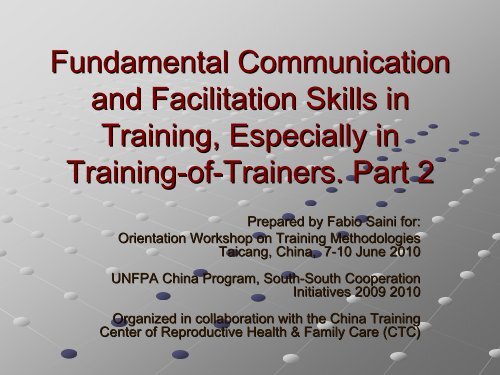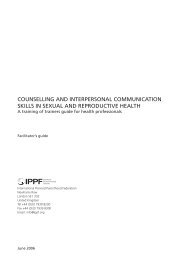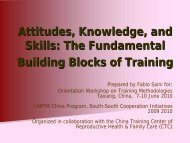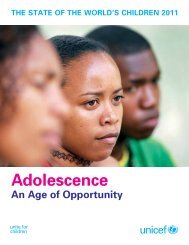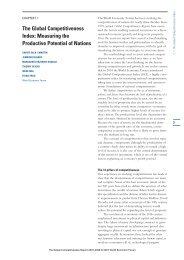Fundamental Communication and Facilitation Skills in Training ...
Fundamental Communication and Facilitation Skills in Training ...
Fundamental Communication and Facilitation Skills in Training ...
You also want an ePaper? Increase the reach of your titles
YUMPU automatically turns print PDFs into web optimized ePapers that Google loves.
<strong>Fundamental</strong> <strong>Communication</strong><br />
<strong>and</strong> <strong>Facilitation</strong> <strong>Skills</strong> <strong>in</strong><br />
Tra<strong>in</strong><strong>in</strong>g, Especially <strong>in</strong><br />
Tra<strong>in</strong><strong>in</strong>g-of Tra<strong>in</strong><strong>in</strong>g of-Tra<strong>in</strong>ers. Tra<strong>in</strong>ers. Part 2<br />
Prepared by Fabio Sa<strong>in</strong>i for:<br />
Orientation Workshop on Tra<strong>in</strong><strong>in</strong>g Methodologies<br />
Taicang, Taicang,<br />
Ch<strong>in</strong>a, 7-10 7 10 June 2010<br />
UNFPA Ch<strong>in</strong>a Program, South-South South South Cooperation<br />
Initiatives 2009 2010<br />
Organized <strong>in</strong> collaboration with the Ch<strong>in</strong>a Tra<strong>in</strong><strong>in</strong>g<br />
Center of Reproductive Health & Family Care (CTC)
One key <strong>Communication</strong> Skill <strong>and</strong><br />
one key <strong>Facilitation</strong> Skill<br />
� Formulat<strong>in</strong>g effective questions to<br />
use <strong>in</strong> participatory methods<br />
� Us<strong>in</strong>g effectively questions as key<br />
facilitation tools for enhanc<strong>in</strong>g<br />
participants’ learn<strong>in</strong>g<br />
2
Let’s Let s rem<strong>in</strong>d ourselves of some basics<br />
Closed-ended Closed ended questions:<br />
� Closed-ended questions produce short answers, often<br />
“yes“ or “no“<br />
� They can be used to check <strong>in</strong> with the group, for example,<br />
to f<strong>in</strong>d out whether or not they underst<strong>and</strong> the material or<br />
are ready to move to the next topic<br />
� Closed-ended questions can also be useful when the tra<strong>in</strong>er<br />
is try<strong>in</strong>g to uncover specific <strong>in</strong>formation or make a po<strong>in</strong>t<br />
� Closed-ended questions are not useful when tra<strong>in</strong>ers are<br />
try<strong>in</strong>g to help participants develop their own reflections,<br />
<strong>in</strong>sights, conclusions, <strong>and</strong> make connections among issues<br />
<strong>and</strong> learn<strong>in</strong>g po<strong>in</strong>ts<br />
3
Open-ended Open ended questions:<br />
Cont<strong>in</strong>ued<br />
� Open-ended questions produce <strong>in</strong>-depth responses, <strong>and</strong><br />
engage learners more fully <strong>in</strong> discussions <strong>and</strong> activities<br />
� Open-ended questions are more effective <strong>in</strong> help<strong>in</strong>g<br />
reta<strong>in</strong><strong>in</strong>g learn<strong>in</strong>g because they engage learners <strong>in</strong> processes<br />
of exploration, analysis, synthesis. They foster creativity<br />
� Open-ended questions beg<strong>in</strong> with<br />
“how,“ “what,“ “when“, “<strong>in</strong> which ways“ “for what<br />
purpose”... If possible, avoid/limit “Why”<br />
� They do not have a “yes” or “no” answer<br />
� Very useful to challenge attitudes h<strong>in</strong>der<strong>in</strong>g learn<strong>in</strong>g<br />
objectives<br />
4
Scenario<br />
�� As your tra<strong>in</strong><strong>in</strong>g team is cont<strong>in</strong>u<strong>in</strong>g to develop<br />
the TOT program, you realize that one of the<br />
sessions <strong>in</strong> the program needs more effective<br />
questions to enhance the learn<strong>in</strong>g of the<br />
participants. Therefore you meet with your<br />
team to develop questions that will achieve<br />
this aim.<br />
5
Scenario <strong>in</strong>structions<br />
Group 1 – Client-centered SRH Counsel<strong>in</strong>g:<br />
� Develop questions to get your TOT participants reflect about<br />
the role of gender issues as barriers for clients of SRH<br />
services (both women <strong>and</strong> men) to discuss sexuality<br />
Group 2 – SRH Youth Friendly Services:<br />
Develop questions to get your TOT participants reflect about<br />
how providers’ attitude may be a barrier to access services<br />
Group 3 - Youth Peer Education for HIV Prevention among<br />
Boys Aged 14-17:<br />
Develop questions to get your TOT participants reflect about<br />
how cultural <strong>and</strong> gender constructs of be<strong>in</strong>g a boy <strong>and</strong> a<br />
man may contribute to risk behavior<br />
6
Thank you!<br />
7


